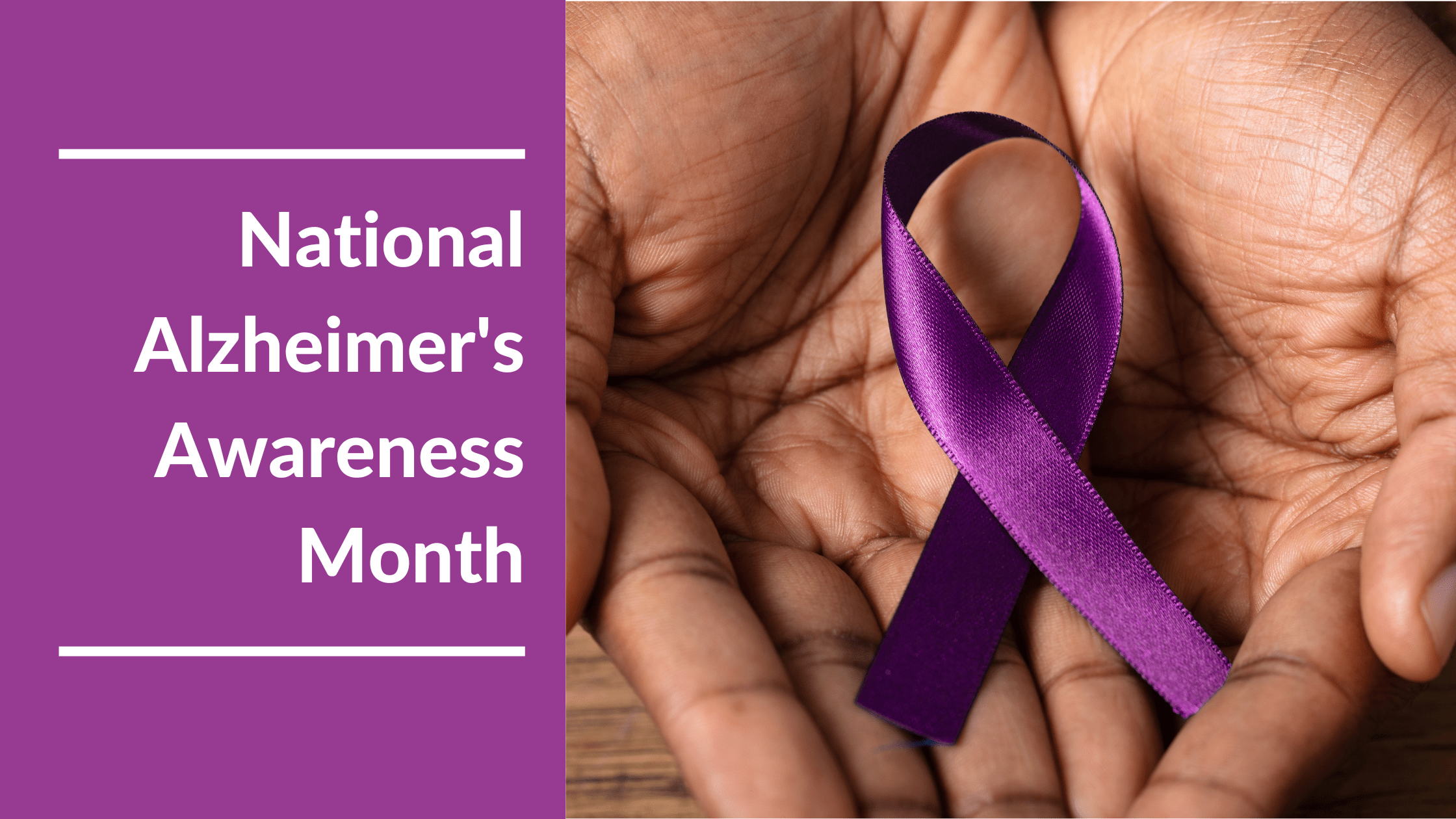
During National Alzheimer’s Awareness Month, take time to learn more about this illness and raise awareness with those around you.
Updated March 1, 2023
National Alzheimer's Awareness Month
When Ronald Reagan designated November as National Alzheimer’s Awareness Month in 1983, fewer than two million Americans had this disease. Since then, more than five million people have been diagnosed with Alzheimer’s. Furthermore, over 10 million informal caregivers care for someone with this disease.
This statistic is troubling; sadly, as the country’s aging population grows, it will become a more significant problem. That is why it is crucial for seniors and their loved ones to learn more about Alzheimer’s Disease, its risk factors, preventative measures, and treatment.
During National Alzheimer’s Awareness Month, take time to learn more about this illness and raise awareness with those around you. The more information we know about it, the more people can take steps to protect their mental and physical health.
National Alzheimer's Awareness Month Promotes Education & Awareness
What Is Alzheimer's Disease?
Alzheimer’s is a form of dementia that destroys the brain’s nerve cells and tissues. This devastating disease can cause memory loss, diminished cognition, and the inability to plan. Sadly, it can also render the patient unable to speak, recognize loved ones, control their behaviors, or care for themselves.
Alzheimer’s disease is the sixth leading cause of death in the US and the most common form of dementia, making up about 60-80% of cases. Every 70 seconds, a new patient is diagnosed with Alzheimer’s in the US.
Research is continuously underway to find answers for Alzheimer’s patients and their families, but sadly, there is no cure. But, some treatments have the possibility of slowing its growth. Unfortunately, the effectiveness of these treatments varies, as Alzheimer’s affects everyone differently, and some cases could be more aggressive than others.
Initially, Alzheimer’s Disease might begin with moderate memory problems. But as it progresses, the effects worsen, diminishing the ability to perform routine tasks. It also impairs awareness and communication.

Alzheimer’s is more likely to occur in seniors older than 65, although early-onset Alzheimer’s affects thousands under that age. Once symptoms are apparent, the average life expectancy is eight years, though some have lived as many as 20 years. However, longevity varies depending on various health factors.
Stages Of Alzheimer's DIsease
Because Alzheimer’s is a progressive condition, the effects slowly worsen as it advances to new stages, which include:
- Stage 1: Symptoms typically are not present. Early detection is possible depending on family history.
- Stage 2: Early signs like forgetfulness commonly occur.
- Stage 3: Moderate mental and physical limitations like memory and concentration changes develop. Often, only people closest to the individual detect these changes.
- Stage 4: Alzheimer’s is usually diagnosed at this point as symptoms such as memory loss or difficulty managing routine tasks becoming more apparent, though it is still classified as “mild.”
- Stage 5: Symptoms ranging from mild to severe necessitate care from family or caregivers.
- Stage 6: Individuals often lose the complete ability to care for themselves. They likely require a caregiver to assist with feeding, bathing, dressing, and other essential tasks.
- Stage 7: By this stage, the individual may completely lose their ability to communicate or make facial expressions.
Each stage requires more help from a caregiver. Therefore, family caregivers should find resources and build a support system to manage their own care.
What Are The Symptoms Of Alzheimer's Disease?
National Alzheimer’s Awareness Month promotes awareness about the symptoms of Alzheimer’s Disease to increase early detection.
Understanding the signs of Alzheimer’s will help you notice changes in your loved one. While there may not be a cure, catching it early on can make a massive difference in the care and treatment your loved one will receive. So during National Alzheimer’s Awareness Month, take a moment to learn about these symptoms:
- Memory loss. Your loved one might forget dates, events, or things they’ve learned or repeatedly ask for the same information.
- Losing items or struggling to retrace their steps. As your loved one forgets other things, they might start misplacing belongings and be unable to backtrack to remember where they could be. This might cause your loved one to blame those around them for stealing because they can’t find what they are looking for.
- Difficulties with planning or problem-solving. Your loved one may spend more time finishing tasks they previously breezed through. They may also struggle to follow simple directions.
- Confusion. Alzheimer’s can cause patients to lose track of time and forget where they are or how they got there in the first place.
- Mood and personality changes. As the disease alters your loved one’s mind, their mood and personality might change. For example, they might become confused, suspicious, or depressed.
Unfortunately, nothing can prevent Alzheimer’s disease. As the Alzheimer’s Association states, “Everyone who has a brain is at risk to develop Alzheimer’s, the only leading cause of death that cannot be prevented, cured or even slowed.”
But, a growing body of research has found a link between healthy lifestyles and lower dementia and Alzheimer’s rates. While not definitive, the following may reduce your risk:
- A healthy social life
- Avoiding cigarettes and alcohol
- Regular physical and mental exercises
- Maintaining a plant-based diet high in antioxidants
Before you make any significant lifestyle adjustments, make sure to discuss them with your doctor.
How Is Alzheimer's Disease Diagnosed?
National Alzheimer’s Awareness Month encourages early testing and detection. Unfortunately, doctors can only conclusively diagnose Alzheimer’s by studying a patient’s brain tissue after death. But of course, health professionals can utilize other tests to determine the person’s mental abilities and reach a diagnosis.
Doctors generally begin with a medical history assessment that includes questions about:
- Symptoms
- Family history
- Diet, substance use, and lifestyle
- Existing or previous conditions and prescriptions
After that, the doctor will perform a series of tests to reach a diagnosis. These include:
- Mental tests: Doctors examine short- and long-term memory as well as time and place awareness. They usually ask questions such as that day’s date, the current sitting president, or the ability to recall short lists.
- Physical tests: Your doctor reviews your heart rate, blood pressure, and temperature. Depending on the situation, you may have to provide a urine or blood sample for ongoing testing.
- Neurological tests: These exams help doctors eliminate other potential diagnoses or health conditions. The doctor can also test your reflexes, speaking ability, and muscle tone.
- Brain tests: These are usually performed with an MRI, CT scan, or PET scans to identify physical signs of dementia in the brain.
Treatments For Alzheimer's Disease
Sadly, there is no cure for Alzheimer’s, although several treatments can minimize the symptoms and slow the disease’s progression. The type of treatment your loved one’s doctor prescribes will depend on the severity of the disease.
Prescription Treatments For Alzheimer's Disease
National Alzheimer’s Awareness Month encourages researchers to study and develop potential treatments continually.
For early to mild Alzheimer’s, physicians may prescribe Aricept or Exelon, which increases acetylcholine levels. Acetylcholine is a neurotransmitter that promotes memory.
For moderate or late-stage Alzheimer’s, your doctor might prescribe Aricept or NamendaAlzheimer’sases the symptoms of excessive glutamate, which kills brain cells.
Your loved one’s doctor may suggest depression and anxiety medications. Some doctors also prescribe antipsychotics to ease other symptoms, such as:
- Hallucinations
- Depression
- Restlessness
- Aggression
- Irritability
Lifestyle Changes
National Alzheimer’s Awareness Month advocates promote several lifestyle changes to slow the onset of this disease. Additionally, your loved one’s doctor may recommend several lifestyle changes to help your loved one better manage their disease. Doctors usually work with patients to form strategies to improve:
- Focus
- Confusion
- Daily rest
- Stress levels
- Confrontational events
Caring For Someone With Alzheimer's Disease
Though a cure for this disease has yet to be found, there are ways to support your loved one, mainly while it is still in its initial stages. For example:
- Maintain a routine. A consistent everyday system will help lessen confusion and let your loved one know what to expect.
- Avoid overstimulation. When communicating with your loved one, discuss ideas one at a time. Doing so will improve comprehension and encourage their engagement.
- Help your loved one feel at ease. Make it a habit to reassure your loved one that they are safe with you and make them feel as comfortable as possible. Directly telling your loved one they are safe with you can be very effective.
Caring for a loved one with Alzheimer’s may be more manageable in its early stages. But as it advances, you might face challenges that you may not be able to handle.
Those who have this disease may become dangerous to themselves. For example, your loved one might wander off or forget to turn off the stove. When such events occur, it might be time to consider a facility specializing in Alzheimer’s care, so your loved one can get the help they need.
National Alzheimer's Awareness Month Events and Activities

This month, many organizations like the Alzheimer’s Association focus on informing people about this disease, including treatments and ways to help cope.
There are also many “memory walks” hosted by other groups in the months before November. These fundraising events help raise money for research about Alzheimer’s.
Visit the Walk to End Alzheimer’s website and find a walk in your area and other ways to get involved. If you cannot participate in a walk, donations are a great way to help. Or, you can volunteer with services that work with Alzheimer’s patients in your city.
As you become more aware of this illness this month, consider taking the National Memory Screening Program. This free program is available across the US and offers confidential memory screenings.
National Alzheimer's Awareness Month Promotes Resources For Family Caregivers
Besides National Alzheimer’s Awareness Month, November is also National Family Caregiver’s Month, which recognizes the dedication that many family caregivers give daily.
Caring for a loved one with Alzheimer’s can be overwhelming, but resources are available to help. Here is a list of free resources from the Alzheimer’s Association to assist family caregivers and their loved ones:
- A Virtual Library with over 5,000 books, journals, cassettes, videos, and CDs borrow, as well as comprehensive information about this disease and free online workshops.
- To connect caregivers with professionals and each other, the Association has a 24/7 Helpline to offer support for families. Call 800-272-3900. For online support, check out ALZConnected™.
- Get organized with a Care Team Calendar to streamline care with family and friends using Alzheimer’s Navigator™. Use it to help make individualized action plans, plus tools for developing healthy coping mechanisms.
MeetCaregivers Supports National Alzheimer's Awareness Month
Alzheimer’s is a devastating, complex disease we still know little about. There is no cure or preventable treatment, though some medications and lifestyle changes can slow its progression. National Alzheimer’s Awareness Month is the perfect time to learn about cognitive decline and find ways to support those with this disease.
If you suspect your loved one has Alzheimer’s or dementia, contact their doctor immediately. They can determine your parent’s health, offer a strategy to manage the symptoms, and help you find a support network.
If you provide care for a loved one with Alzheimer’s, it’s okay to acknowledge your limitations. Respite care is a valuable resource for caregivers who need a break because it allows them to spend more time caring for themselves.
MeetCaregivers can help. Call 1 (888) 541-1136 to ask about respite care, or get started today and find a caregiver.
You can find more resources, guides, and how-tos about caregiving and aging in place on our Blog.
- Altman, A. (2022, September 20). National Alzheimer’s Disease Awareness Month. Alzheimer’s Awareness Month 2022 | Discuss Alzheimer’s This November. Retrieved November 1, 2019, from https://www.seniorliving.org/memory-care/alzheimers/awareness/ Updated September 20, 2022
- Alz01. (2014, August 27). November Is Alzheimer’s Awareness Month. November is Alzheimer’s Awareness Month. Retrieved November 1, 2019, from https://www.alzinfo.org/articles/november-is-alzheimers-awareness-month/
